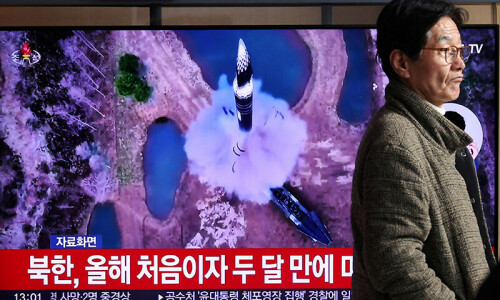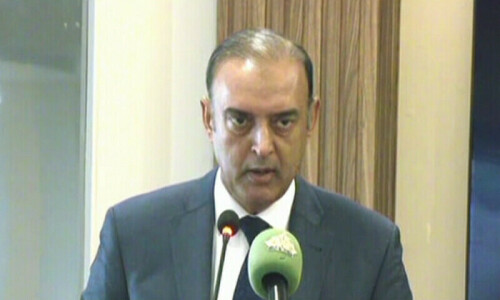
NEW DELHI: India may nervously wonder if Osama bin Laden's death will hasten a triumphalist US withdrawal from Afghanistan and leave New Delhi exposed to an unfriendly, Pakistan-dominated neighborhood and unfettered militancy in its backyard.
For India, bin Laden's death deep in Pakistan confirmed what it had long suspected, that a so-called Western ally was turning a blind eye to militant networks on its soil - a fear reinforced by the 2008 Pakistani militant attacks on Mumbai.
But even more worrying for New Delhi would be any sign that President Barack Obama will use the death to speed up withdrawal of troops from Afghanistan, leaving a vacuum that its nuclear-armed foe Pakistan and the Taliban may only be to happy to fill.
“The clear issue is the need to focus on the situation in Afghanistan,” a senior Indian government source, who declined to be named, said in reference to the situation post-bin Laden.
“No-one wants a precipitous withdrawal of international forces in Afghanistan. There is still much work to be done.”
Both India and Pakistan, which have gone to war three times since 1947, have for decades sought to secure leverage in this Central Asian geopolitical crossroads. That has gained urgency after Obama's tentative timeline to start to withdraw military forces from July.
“India's eyes will be more on the US than Pakistan,” said Siddharth Varadarajan, an associate editor at The Hindu newspaper. “India will be looking at the end game”.
After eliminating its top target in the region, the US administration has publicly said it is committed to Afghanistan. But Washington observers and lawmakers say there is little doubt pressure will fall on Obama for a withdrawal of troops as he battles a budget deficit and an upcoming election campaign.
A DANGEROUS NEIGHBOURHOOD
Indian Prime Minister Manmohan Singh has spent political credit on dialogue with Islamabad, seeing any peace deal as the crowning achievement of his premiership, despite a trend of having his fingers burned by Pakistan.
His olive branch in 2006 was dashed by the Mumbai carnage, an attempt to kick-start talks in Egypt in 2009 was pilloried by the Hindu nationalist opposition at home, and the news of bin Laden' s Pakistan sanctuary came only weeks after Singh's “cricket diplomacy” initiative.
That rapprochement will continue. While Indian newspapers reveled in a chorus of Pakistani condemnation, a carefully worded statement from the prime minister appeared to keep India on course for dialogue despite the lack of trust.
“India works on the assumption Pakistan will continue to deceive. The government will continue to engage with the full knowledge Pakistan is colluding with the bad guys,” said Varadarajan.
The US may increasingly see Pakistan through the prism of its ties with India, shifting a regional approach from Af-Pak to India-Pak as operations diminish in Afghanistan. But New Delhi has resisted this link, fearing US-led pressure to resolve the disputed regional of Kashmir, which it claims in full.
“Pakistan will become even more of a shared concern for the US and India,” said Ranjit Gupta, member of the Indian Security Advisory Council of the US-India Institute, a Washington-based think-tank.
“US thinking may bring together India and Pakistan... but not in the old sense of the hyphenation where the pressure was always on India. The onus will now be on Pakistan. ”
New Delhi fears a return to the 1990s in Afghanistan, when both a civil war and Taliban control fostered militant groups in the region and fuelled attacks on India.
“New Delhi has been contemplating the impact of a US withdrawal from Afghanistan for while. If the US left lock, stock and barrel, India would be left to pick up the pieces,” said Harsh V. Pant of the Defence Studies Department, King's College London.
India is Afghanistan's biggest regional aid donor and its dollar 1.3 billion of projects, from building a parliament to a highway to Iran, shows what Indian officials like to call their “soft power” to win hearts and minds in Afghanistan.
Washington has been happy to see that aid. But US ally Pakistan has publicly derided India's attempt to secure influence in what it see as its own backyard.
Pakistan accuses India of backing separatists in Baluchistan, an area which spills into Afghanistan. India denies the charge.
“India has co-ordinated its Afghan policy with the US, as it now realises it has no leverage over Pakistan. The best asset India has is a western presence in Afghanistan,” said Pant.
RAPPROCHEMENT
India has sometimes appeared frustrated at Washington for not pressuring Pakistan more, citing its proximity and susceptibility to attacks from militants based in the country.
But that has not stopped India from reaching out, most recently when Singh invited his counterpart Yusuf Raza Gilani to watch a World Cup cricket match between the rivals in March, described by India's foreign secretary as "re-engagement" talks.
Until now there has been little political risk for Singh. His tentative moves to Islamabad have not sparked outrage from voters for whom billion-dollar corruption scandals and persistently high inflation are far bigger concerns.
So India has little to gain in using bin Laden's death to press Pakistan harder. India has achieved little with hawkish stances and there is recognition that it only risks strengthening Pakistan's hardliners.
"India is not going to push it hard because the whole process of normalization will run into trouble, and Pakistan doesn't want that and the Indian government doesn't want that," said Hasan Askari Rizvi, a Pakistani political analyst.
In the aftermath of the Mumbai attacks US officials in 2008 called for India to tone down its rhetoric, a cable obtained by WikiLeaks said. It is a policy that seems to have sunk in with Singh and Shivshankar Menon, the national security advisor seen as a major architect of India's Pakistan policy.
The 78-year-old Singh, who was born in what is now Pakistan, even appointed an envoy to conduct secret talks with the head of Pakistan's army, General Ashfaq Kayani, a report in the Times newspaper in London said last month.
Singh's office, later, said the report was false.













































Dear visitor, the comments section is undergoing an overhaul and will return soon.